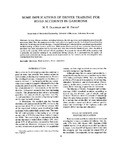| dc.contributor.author | Oladiran, M.T. | |
| dc.contributor.author | Pheko, H. | |
| dc.date.accessioned | 2011-02-09T13:48:11Z | |
| dc.date.available | 2011-02-09T13:48:11Z | |
| dc.date.issued | 1995 | |
| dc.identifier.citation | Oladiran, M.T. & Pheko, H. (1995) Some implications of driver training for road accidents in Gaborone, Accident Analysis & Prevention, Vol. 27, No. 4, pp. 583-590 | en_US |
| dc.identifier.issn | 0001-4575 | |
| dc.identifier.uri | http://hdl.handle.net/10311/669 | |
| dc.description.abstract | In many African countries, including Botswana, the driving schools and instruction given to pupils are uncontrolled. Thus, this paper presents the results of an investigation into the level of professional training offered by the driving schools in Gaborone. A total of 400 randomly selected drivers completed questionnaires on their training, accident records, and L-tests. Male trainee drivers received more instruction than females, and there was some indication that the pass rate on L-tests was lower for female drivers. Also, the pickup van forms the majority of the national vehicle population. It accounts for almost 40% of the accidents but is presently not used for training in the commercial driving schools. It is concluded that the quality of professional instruction in driving schools needs improvement so that learners can be encouraged to take training from these institutes. | en_US |
| dc.language.iso | en | en_US |
| dc.publisher | Elsevier Science Ltd, http://journals.elsevier.com/00014575/accident-analysis-and-prevention/ | en_US |
| dc.subject | Botswana | en_US |
| dc.subject | Road accidents | en_US |
| dc.subject | Driver instruction | en_US |
| dc.title | Some implications of driver training for road accidents in Gaborone | en_US |
| dc.type | Published Article | en_US |

